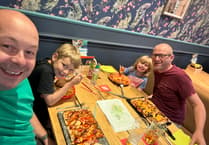Rosie Barrett has dyed her hair bright orange once again to raise funds and awareness for the Bone Cancer Research Trust in memory of her son, Hugh.
Hugh died at 19 from Ewing's Sarcoma, a rare form of bone cancer, for which there is so far no cure.
Hugh was an active and strong teenager when his symptoms first appeared. It took 10 months for doctors to diagnose Ewing’s Sarcoma, and Rosie has spoken openly about how difficult it was to get answers while the disease quietly advanced. Rosie said, “It took 10 months to diagnose Hugh’s Ewing’s Sarcoma. It wasn’t picked up until it was very obvious because when he took his shirt off, his shoulder was completely deformed. But 15-year-olds don’t want to make a fuss, do they? And all the doctors said it was probably a rugby injury.”
Ewing’s Sarcoma is a primary bone cancer that mainly affects children, teenagers and young adults. It can develop in any bone, though it is most often discovered in the pelvis, chest or leg bones. It can also begin in soft tissue. Because it is rare and because symptoms mimic other conditions, diagnosis often takes time. Bone pain, reduced movement, swelling, fractures, and unexplained bruising can all be possible symptoms, though they vary significantly from patient to patient. Many young people experiencing discomfort attribute it to growth or sport, and in the early stages, symptoms can settle down before returning. These factors contribute to the challenges of getting a clear medical picture, and delays in diagnosis reduce treatment options.
Once diagnosed, treatment is typically highly aggressive, involving chemotherapy, radiotherapy and surgery, but even then the cancer can return. Rosie now works hard to raise awareness of the importance of recognising symptoms early. She wants families to push for a proper investigation if something feels wrong, rather than accept a reassurance that does not match the level of pain or visible changes in a child’s body.
She also continues to stress the urgent need for research funding. While there have been scientific advances in recent years, Ewing’s Sarcoma still carries a survival rate of fewer than five years unless patients are extremely fortunate. Rosie believes that awareness and focused research are the only realistic routes to improving outcomes. She said, “For those who don’t know about primary bone cancers and Ewing’s in particular, they are rare cancers, so they don’t get much general funding. Ewing’s still has a survival rate of fewer than five years unless you are very lucky. The BCRT raises money for research until there’s a cure.”
The orange hair is not just attention-grabbing. It has become a conversation starter at work, in shops and on the street. Rosie has found that people feel able to approach her and ask why she does it, which gives her a moment to explain the symptoms of Ewing’s Sarcoma and the purpose of her fundraising. The more people who know about the disease, the more chance there is that unusual symptoms in young people will be taken seriously.
Rosie hopes that this year’s challenge will again raise substantial funds for the Bone Cancer Research Trust and wants as many people as possible to support the cause in Hugh’s memory. Donations can be made at: https://justgiving.com/page/rosie-barret6





Comments
This article has no comments yet. Be the first to leave a comment.